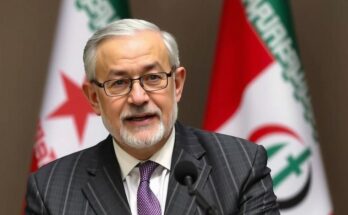Egypt has welcomed the agreement between the Libyan House of Representatives and the State Council to resolve the Central Bank of Libya crisis, appointing Naji Mohamed Issa Belqasem as the new governor. This development is expected to facilitate efforts towards stability in Libya, which has seen disruptions in oil production due to political disputes. Egypt continues to support Libya in collaboration with international partners.
Cairo, 30 September 2024 – Egypt has expressed its approval of the agreement reached between the Libyan House of Representatives and the State Council, which was facilitated by the Acting Head of the United Nations Mission in Libya. This agreement aims to resolve the ongoing crisis concerning the Central Bank of Libya. As part of this arrangement, both entities have jointly appointed Naji Mohamed Issa Belqasem to serve as the new governor of the Central Bank. In a statement released by the Egyptian Foreign Ministry, it was conveyed that Egypt holds optimism that this significant development could instigate the necessary impetus towards achieving stability throughout Libya. Furthermore, Egypt reiterated its dedication to continue supporting the efforts for stabilization in Libya, in conjunction with both regional and international partners, with the ultimate goal of empowering the Libyan populace and fulfilling their aspirations. Libya has been encountering a challenging situation regarding the appointment of a new governor for the Central Bank, which has been a point of contention between the Tobruk-based government, led by Khalifa Haftar, and the Tripoli-based government under Abdul Hamid Dabaiba. This prolonged political standoff has led to the halting of oil production in Libya, causing significant disruptions in the global market and resulting in a rise in oil prices worldwide. To address this, the United Nations has conducted multiple meetings and discussions, ultimately leading to the current agreement between the conflicting parties.
The current situation in Libya is marked by political divisions between two rival governments: the eastern Tobruk-based government led by Khalifa Haftar and the western Tripoli-based government led by Abdul Hamid Dabaiba. This division has resulted in major challenges, particularly in the governance of key institutions, such as the Central Bank of Libya, which has undergone a leadership crisis. The inability to appoint a united leadership has severely impacted Libya’s oil industry, which is critical to the nation’s economy, leading to a suspension in oil production that has ripple effects on the global market.
In summary, Egypt’s approval of the agreement between the Libyan House of Representatives and the State Council symbolizes a hopeful step towards resolving the leadership crisis at the Central Bank of Libya. This development not only aims to stabilize the financial sector within Libya but also seeks to mitigate the broader economic disruptions caused by the political impasse. Egypt remains committed to supporting Libya’s journey towards stability, working alongside international partners to realize the aspirations of the Libyan people.
Original Source: www.egypttoday.com




